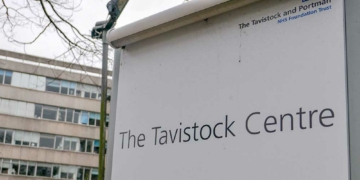“There was a dark joke among staff that there would be no gay people left”. So report The Times here in April 2018 in an article about the Tavistock, with a sub heading reading “Ex-NHS staff fear that homophobia is driving a surge in ‘transgender’ young people”. Such fears appear to have been well founded following the painstaking ruling of Employment Judge Goodman (sitting with two lay tribunal members) in the case of Sonia Appleby, the former statutory safeguarding lead for the Tavistock Gender Identity Service (GIDS) on 3rd September. In a judgment that raises profound safeguarding questions about young people facing homophobia, the tribunal set out how concerns about homophobia raised by Ms. Appleby were ignored while she was vilified and marginalised. The judgment also found that the potentially life changing clinical decisions were made more difficult by homophobic parents and political “external pressures” such as those coming from “a group called Mermaids”.
Ms. Appleby succeeded in her claim under the Employment Rights Act 1996 that she was a “whistle-blower”, that is to say a person raising a public interest concern (called a “protected disclosure” in law). According to the Act, a whistle-blower is entitled to compensation where such protected disclosures result in “detriments”, those being hurt feelings and damage to reputation as a result of action by the employer in this case. Six protected disclosures in total were made, and Ms. Appleby was awarded £20,000 in damages. While some have remarked that seems a low figure, according to the law in this area, it is towards the upper end of the middle category for such cases and represents a serious judgment on the behaviour of the GIDS.
Ms. Appleby started working in social work and safeguarding in 1987 and starting work at GIDS in 2004, she first came to raise safeguarding concerns in June 2016. Two key matters were raised, first an observation that record keeping and medical notes were poor on safeguarding, (a similar concern also raised in the High Court by Sharpe J in Bell v Tavistock). Second, a set of concerns regarding “Gender GP” Dr. Webberley about which the tribunal recorded, “there was a particular and growing concern among some GIDS staff about a private GP, Dr Webberley, who was, on her own initiative, issuing private prescriptions for puberty blocking drugs to young people being assessed by GIDS, or who were on the waiting list for assessment. Staff were uncertain how to deal with this. Concerned that taking hormones before assessment could pose a risk to children”.
The effect of raising these concerns was striking. Dr Polly Carmichael, a senior clinician emailed colleagues saying of Ms. Appleby that she was “unsure of the agenda here” appearing to imply some ulterior motive. Dr. Carmichael denied this was the case in evidence, but Employment Judge Goodman recorded in her judgment that the tribunal were “unconvinced” by the innocent explanation she offered and would later go onto to describe her evidence as “often both verbose and imprecise”.

Sonia Appleby
Ms. Appleby made the first of her “protected disclosures” in an email in October 2017. She said that “predictably, there are challenges regarding Mermaids, rogue medics and the political expectations of a national service”, and she went on to identify divisions within the clinical team including staff feeling that they could not report safeguarding concerns without being branded “transphobic” and tensions arising from a “political conformity”. Read in context the “political conformity” is that of pro affirmation/transition treatment only with dissent punished by allegations of transphobia.
By the time of Ms. Appleby’s second protected disclosure on 13th November 2017 matters had not improved. In this protected disclosure Ms. Appleby warned that Dr Webberly was still prescribing despite apparently having been suspended by the GMC. Inside the service the culture of fear had by this stage reached a point such that it was now hard “for staff to raise safeguarding concerns and this is compounded by staff being referred to as being transphobic”. Gay conversion therapy was by this point an open issue with Ms. Appleby warning that some staff had raised concerns that some young children were actively encouraged to be transgender without effective scrutiny of their circumstances that “some children …falsely protect presenting as being transgender as a less oppressive option than acknowledging they are gay. There is apparently no acceptable mechanism for discussing these phenomena within the team”.
Following a period off work, Ms. Appelby raised similar concerns again on 15 May 2018 having spoken to another colleague. Speaking to her then line manager, she cited (among other matters) concerns as to “patients’ limited understanding, the premature use of blockers, failure to address the fact that some children lived in homophobic environments, that some staff felt themselves unsafe in the group and were afraid to report these issues within the Trust”. Concerns as to gay conversion therapy (and other factors neglected by an ideological approach) were plainly numerous and widely held, and nine days later on 24 May another staff member approached Ms. Appleby and reported concerns as to “children not having access to local mental health services, being exposed to abuse, that some may be gay, and that the challenges were not being thought about consistently”. The Trust’s response was that it “hoped” to develop a clear action plan, some seven months after the first protected disclosure. In October 2018 the homophobia concern was again repeated in an exit interview with staff member Matt Bristow who commented that, in his view there was homophobia in GIDS, that staff worked in a “climate of fear”.
In November 2018, a report by a senior figure at the Tavistock Dr. David Bell became public. The report is entitled “Serious Concerns Regarding the Gender Identity Service, it found “the service as it now functions and children’s needs are being met in a woeful (sic) inadequate manner and some will live on with the damaging consequences”. He said, the service had adopted “an excessively affirmative attitude associated with an inability to stand up to the pressure of a highly publicised external world”. There were “serious ethical concerns” and “inadequacy of consent”, and “systemic homophobia, meaning homophobia was not being identified in children and families, and led to gay and lesbian staff being subject to persecution”. Ms Appleby came to be associated with this report and it is perhaps no coincidence that shortly after this her requests for safeguarding data were called into question and her influence as safeguarding lead seriously curtailed.
Following a period of ill health and return to work, Ms. Appleby was summoned to what she was told was an informal meeting with her new line manager, a Dr. Sinha. When she attended a member of human resources was present, and accusations were made to her as to her conduct and respect for staff and she left the meeting upset. The doctor went on to place a letter on her permanent file including a passage reading “I further suggested that you should ensure you are mindful of any further statements made in the future in relation to this matter or any other that may cause offence to other colleagues”. In a straightforward section of the judgment, Employment Judge Goodman had little difficulty in finding that this was obviously unfair and amounted not to the promised informal meeting, but a quasi-disciplinary process. The tribunal also noted the doctor concerned appeared almost hostile to Ms. Appleby from his first engagements with her for reasons that are not clear.
By February 2020 an independent review into the Tavistock by Andrew Hodge appeared to view matters in much the same way as the tribunal finding that “that Trust clinicians were divided between those who considered the Bell report an overreaction to the inherent complexity of GIDS work, and those concerned about the increase in natal females identifying as male, that gender identity may be a proxy for same-sex orientation, and that there is no thorough exploration of the issues. He concluded that most saw the claimant as a concerned professional, not someone out to make trouble.”
Ms. Appleby succeeded in proving detriments both to reputation and the upset caused to her and there seems little doubt that she will be remembered as a courageous safeguarding lead in what was on any view a deeply hostile and politicised environment. The lasting significance of her case is likely to be factual, rather than legal with a clear picture of the dysfunction and politicisation of the Tavistock now recorded in a lengthy judgment. For anyone doubting or discounting homophobia as a potential issue in medical transition the judgment provides a comprehensive and detailed riposte with clear evidence of such concerns.
Dennis Kavanagh is a legal commentator and barrister (non-practising).
Dennis blogs about LGBT issues and law here
Top photo: Bradley Taylor/Alamy Stock Photo
























Comments
No comments yet, be the first to leave a comment.